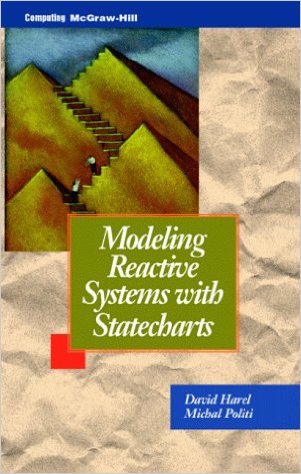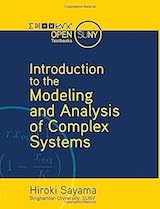
|
FreeComputerBooks.com
Links to Free Computer, Mathematics, Technical Books all over the World
|
|
- Title: Modeling Reactive Systems With Statecharts: The Statemate Approach
- Author(s) David Harel, Michal Politi
- Publisher: Mcgraw-Hill (Tx) (October 8, 1998)
- Hardcover: 258 pages
- eBook: HTML and PDF
- Language: English
- ISBN-10: 0070262055
- ISBN-13: 978-0070262058
- Share This:

|
The book provides a detailed description of a set of languages for modelling reactive systems, which underlies the STATEMATE toolset. The approach is dominated by the language of Statecharts, used to describe behavior, combined Activity-charts for describing activities (i.e., the functional building blocks-capabilities or objects) and the data that flows between them.
These two languages are used to develop a conceptual model of the system, which can be combined with the system's physical, or structural model, described in a third language-Module-charts. The three languages are highly diagrammatic in nature, constituting full-fledged visual formalisms, complete with rigorous semantics. They are accompanied by a Data Dictionary for specifying additional parts of the model that are textual in nature.
About the Authors- Author David Harel invented Statecharts, and he and coauthor Michal Politi co-developed the other two languages in the set. .
- Computational Simulations and Modeling
- Computer System, Organization, and Architecture
- Operating Systems Design and Construction
- Embedded Systems Programming
- Electronic and Computer Engineering
 Similar Books:
Similar Books:
-
 Introduction to the Modeling and Analysis of Complex Systems
Introduction to the Modeling and Analysis of Complex Systems
This textbook offers an accessible yet technically-oriented introduction to the modeling and analysis of complex systems. Complex systems are systems made of a large number of microscopic components interacting with each other in nontrivial ways.
-
 Modeling and Simulation in Python (Allen B. Downey)
Modeling and Simulation in Python (Allen B. Downey)
This book is an introduction to physical modeling using a computational approach with Python. You will learn how to use Python to accomplish many common scientific computing tasks: importing, exporting, and visualizing data; numerical analysis; etc.
-
 Modelling and Simulation for Big Data Applications
Modelling and Simulation for Big Data Applications
Long considered important pillars of the scientific method, Modelling and Simulation have evolved from traditional discrete numerical methods to complex data-intensive continuous analytical optimisations.
-
 Foundations of Machine Learning (Mehryar Mohri, et al)
Foundations of Machine Learning (Mehryar Mohri, et al)
This book is a general introduction to machine learning. It covers fundamental modern topics in machine learning while providing the theoretical basis and conceptual tools needed for the discussion and justification of algorithms.
-
 Machine Learning Yearning (Andrew Ng)
Machine Learning Yearning (Andrew Ng)
You will learn how to align on ML strategies in a team setting, as well as how to set up development (dev) sets and test sets. After finishing this book, you will have a deep understanding of how to set technical direction for a machine learning project.
-
 Understanding Machine Learning: From Theory to Algorithms
Understanding Machine Learning: From Theory to Algorithms
Explains the principles behind the automated learning approach and the considerations underlying its usage. Provides an extensive theoretical account of the fundamental ideas underlying machine learning and the mathematical derivations.
-
 Reinforcement Learning: An Introduction, Second Edition
Reinforcement Learning: An Introduction, Second Edition
It provides a clear and simple account of the key ideas and algorithms of reinforcement learning that is accessible to readers in all the related disciplines. Focuses on core online learning algorithms, with the more mathematical material set off in shaded boxes.
-
 Probabilistic Machine Learning: An Introduction (Kevin Murphy)
Probabilistic Machine Learning: An Introduction (Kevin Murphy)
This book is a comprehensive introduction to machine learning that uses probabilistic models and inference as a unifying approach. It is written in an informal, accessible style, complete with pseudo-code for the most important algorithms.
|
:
|
|
 |
|
 |
|
 |
|
 |
|
 |
|
 |
|
 |
|
 |
|
 |
|
 |
|
 |
|
 |
|
 |
|
 |
|
 |
|
 |
|
 |
|



